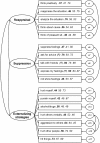The negative affect repair questionnaire: factor analysis and psychometric evaluation in three samples
- PMID: 23302222
- PMCID: PMC3558324
- DOI: 10.1186/1471-244X-13-16
The negative affect repair questionnaire: factor analysis and psychometric evaluation in three samples
Abstract
Background: Negative affect and difficulties in its regulation have been connected to several adverse psychological consequences. While several questionnaires exist, it would be important to have a theory-based measure that includes clinically relevant items and shows good psychometric properties in healthy and patient samples. This study aims at developing such a questionnaire, combining the two Gross [1] scales Reappraisal and Suppression with an additional response-focused scale called Externalizing Behavioral Strategies covering clinically relevant items.
Methods: The samples consisted of 684 students (mean age = 23.3, SD = 3.5; 53.6% female) and 369 persons with mixed mental disorders (mean age = 36.0 SD = 14.6; 71.2% female). Items for the questionnaire were derived from existing questionnaires and additional items were formulated based on suggestions by clinical experts. All items start with "When I don't feel well, in order to feel better…". Participants rated how frequently they used each strategy on a 5-point Likert scale. Confirmatory Factor Analyses were conducted to verify the factor structure in two separate student samples and a clinical sample. Group comparisons and correlations with other questionnaires were calculated to ensure validity.
Results: After modification, the CFA showed good model fit in all three samples. Reliability scores (Cronbach's α) for the three NARQ scales ranged between .71 and .80. Comparisons between students and persons with mental disorders showed the postulated relationships, as did comparisons between male and female students and persons with or without Borderline Personality Disorder. Correlations with other questionnaires suggest the NARQ's construct validity.
Conclusions: The results indicate that the NARQ is a psychometrically sound and reliable measure with practical use for therapy planning and tracking of treatment outcome across time. We advocate the integration of the new response-focused strategy in the Gross's model of emotion regulation.
Figures
Similar articles
-
The Mindful Eating Behavior Scale: Development and Psychometric Properties in a Sample of Dutch Adults Aged 55 Years and Older.J Acad Nutr Diet. 2018 Jul;118(7):1277-1290.e4. doi: 10.1016/j.jand.2018.01.015. Epub 2018 Apr 11. J Acad Nutr Diet. 2018. PMID: 29655657
-
[The alexithymia questionnaire for children (AQC): Psychometric properties in a sample of 105 adolescents hospitalized in an adolescent psychiatric department].Encephale. 2018 Apr;44(2):148-151. doi: 10.1016/j.encep.2016.08.010. Epub 2016 Oct 10. Encephale. 2018. PMID: 27745718 French.
-
The Social Safeness and Pleasure Scale (SSPS): a psychometric evaluation of the Swedish version in a non-clinical sample and two clinical samples with eating disorders or borderline personality disorder.BMC Psychol. 2022 Dec 16;10(1):311. doi: 10.1186/s40359-022-01020-2. BMC Psychol. 2022. PMID: 36527142 Free PMC article.
-
Confirmatory factor analysis and examination of the psychometric properties of the eating beliefs questionnaire.BMC Psychiatry. 2017 Jul 3;17(1):237. doi: 10.1186/s12888-017-1394-z. BMC Psychiatry. 2017. PMID: 28673268 Free PMC article.
-
Factor structure and construct validity of the Eating Disorder Examination-Questionnaire in college students: further support for a modified brief version.Int J Eat Disord. 2015 Apr;48(3):284-9. doi: 10.1002/eat.22358. Epub 2014 Oct 27. Int J Eat Disord. 2015. PMID: 25346071 Free PMC article.
Cited by
-
@myTabu-A Placebo Controlled Randomized Trial of a Guided Web-Based Intervention for Individuals Who Sexually Abused Children and Individuals Who Consumed Child Sexual Exploitation Material: A Clinical Study Protocol.Front Psychiatry. 2021 Jan 8;11:575464. doi: 10.3389/fpsyt.2020.575464. eCollection 2020. Front Psychiatry. 2021. PMID: 33488416 Free PMC article.
-
Differential effects of trait-like emotion regulation use and situational emotion regulation ability across the affective and anxiety disorders spectrum: a transdiagnostic examination.Sci Rep. 2024 Nov 4;14(1):26642. doi: 10.1038/s41598-024-76425-7. Sci Rep. 2024. PMID: 39496705 Free PMC article.
References
-
- Gross JJ. The emerging field of emotion regulation: an integrative review. Rev Gen Psychol. 1998;2(Suppl 3):271–299. doi: 10.1037/1089-2680.2.3.271. - DOI
MeSH terms
LinkOut - more resources
Full Text Sources
Other Literature Sources


